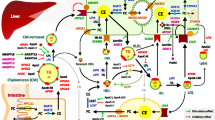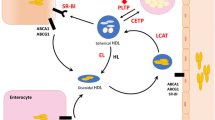Abstract
The relationship between dietary composition/cholesterol-lowering therapy and final plasma lipid levels is to some extent genetically determined. It is clear that these responses are under polygenic control, with multiple variants in many genes participating in the total effect (and with each gene contributing a relatively small effect). Using different experimental approaches, several candidate genes have been analyzed to date.
Interesting and consistent results have been published recently regarding the A-204C promoter variant in the cholesterol 7α-hydroxylase (CYP7A1) gene. CYP7A1 is a rate-limiting enzyme in bile acid synthesis and therefore plays an important role in maintaining cholesterol homeostasis. CYP7A1-204CC homozygotes have the greatest decrease in total cholesterol level in response to dietary changes in different types of dietary intervention studies. In contrast, one study has reported that the effect of statins in lowering low-density lipoprotein (LDL)-cholesterol levels was slightly greater in -204AA homozygotes.
The CYP7A1 A-204C variant accounts for a significant proportion of the genetic predisposition of the response of plasma cholesterol levels.



Similar content being viewed by others
References
Katan MB, Beyen AC, de Vries JH, et al. Existence of consistent hypo- and hyperresponders to dietary cholesterol. Am J Epidemiol 1986; 123: 221–34
Mooser V, Waterworth DM, Isenhour T, et al. Cardiovascular pharmacogenetics in the SNP era. J Thromb Haemost 2003; 1: 1398–402
Masson LF, McNeill G, Avenell A. Genetic variation and the lipid response to dietary intervention: a systematic review. Am J Clin Nutr 2003; 77: 1098–111
Tikkanen M, Huttunen JK, Pajukanta PK, et al. Apolipoprotein E polymorphism and dietary plasma cholesterol response. Can J Cardiol 1995; 11 Suppl. G: 93G–6G
Davignon J, Gregg RE, Sing CF. Apolipoprotein E polymorphism and atherosclerosis. Atherosclerosis 1988; 8: 1–21
Weggemans RM, Zock PL, Urgert R, et al. Differences between men and women in the response of serum cholesterol to dietary changes. Eur J Clin Invest 1999; 29: 827–34
Ordovas JM, Schaefer EJ. Genetic determinants of plasma lipid response to dietary intervention: the role of the APOA1/C3/A4 gene cluster and the APOE gene. Br J Nutr 2000; 83 Suppl. 1: S127–36
Groenendijk M, Cantor RN, de Bruin TWA, et al. The apoAI-CIII-AIV gene cluster. Atherosclerosis 2001; 157: 1–11
Humphries SE, Talmud PJ, Cox C, et al. Genetic factors affecting the consistency and magnitude of changes in plasma cholesterol in response to dietary challenge. QJM 1996; 89: 671–80
Vincent S, Planells R, Defoort C, et al. Genetic polymorphisms and lipoprotein responses to diets. Proc Nutr Soc 2002; 61: 427–34
McCombs RJ, Marcadis DE, Ellis J, et al. Attenuated hypercholesterolemic response to a high-cholesterol diet in subjects heterozygous for the apolipoprotein A-IV-2 allele. N Engl J Med 1994; 331: 706–10
Mata P, Ordovas JM, Lopez-Miranda J, et al. Apo A-IV phenotype affects diet-induced plasma LDL cholesterol lowering. Arterioscler Thromb 1994; 14: 884–91
Swell L, Gustafsson J, Schwartz CC, et al. An in vivo evaluation of the quantitative significance of several potential pathways to cholic and chenodeoxycholic acids from cholesterol in man. J Lipid Res 1980; 21: 455–66
Schwarz M, Lund EG, Russell DW. Two 7 alpha-hydroxylase enzymes in bile acid biosynthesis. Curr Opin Lipidol 1998; 9: 113–8
Cohen JC, Cali JJ, Jelinek DF, et al. Cloning of the human cholesterol 7 alpha-hydroxylase gene (CYP7) and localization to chromosome 8q11-ql2. Genomics 1992; 14: 153–61
Wang DP, Chiang JY. Structure and nucleotide sequences of the human cholesterol 7 alpha-hydroxylase gene (CYP7). Genomics 1994; 2: 320–3
Chiang JY, Kimmel R, Stroup D. Regulation of cholesterol 7alpha-hydroxylase gene (CYP7A1) transcription by the liver orphan receptor (LXRalpha). Gene 2001; 262: 257–65
Duane WC, Levitt DG, Mueller SM, et al. Regulation of bile acid synthesis in man: presence of a diurnal rhythm. J Clin Invest 1983; 72: 1930–6
Wang J, Freeman DJ, Grundy SM, et al. Linkage between cholesterol 7alpha-hydroxylase and high plasma low-density lipoprotein cholesterol concentrations. J Clin Invest 1998; 101: 1283–91
Couture P, Otvos JD, Cupples LA, et al. Association of the A-204C polymorphism in the cholesterol 7alpha-hydroxylase gene with variations in plasma low density lipoprotein cholesterol levels in the Framingham Offspring Study. J Lipid Res 1999; 40: 1883–9
Hubacek JA, Pistulkova H, Skodova Z, et al. Polymorphism in the regulatory part of the cholesterol 7 alpha hydroxylase gene in children with high and low levels of cholesterol [in Czech]. Cas Lek Cesk 2003; 142: 423–6
Zhou B, Zhang SZ, Xiao CY, et al. Association of cholesterol 7alpha-hydroxylase gene polymorphism with levels of plasma lipids [in Chinese]. Yi Chuan 2004; 26: 283–6
Hofman MK, Groenendijk M, Verkuijlen PJ, et al. Modulating effect of the A-278C promoter polymorphism in the cholesterol 7alpha-hydroxylase gene on serum lipid levels in normolipidaemic and hypertriglyceridaemic individuals. Eur J Hum Genet 2004; 12: 935–41
Hubacek JA, Pitha J, Skodova Z, et al. Czech MONICA Study Polymorphisms in CYP-7A1, not APOE, influence the change in plasma lipids in response to population dietary change in an 8 year follow-up; results from the Czech MONICA study. Clin Biochem 2003; 36: 263–7
Poledne R, Skodova Z. Changes in nutrition, cholesterol concentration, and cardiovascular disease mortality in the Czech population in the past decade. Nutrition 2000; 16: 785–6
Kovar J, Suchanek P, Hubacek JA, et al. The A-204C polymorphism in the cholesterol 7alpha-hydroxylase (CYP7A1) gene determines the cholester-olemia responsiveness to a high-fat diet. Physiol Res 2004; 53: 565–8
Hofman MK, Wegemans RM, Zock PL, et al. Subjects with the AA genotype of the A-278C polymorphism in the cholesterol 7 alpha-hydroxylase gene display a lower response to a dietary challenge with cholesterol or cafestol than CC homozygotes [abstract]. Atherosclerosis 2002; 3 Suppl.: 126
Hofman MK, Wegemans RM, Zock PL, et al. CYP7A1 A-278C polymorphism affects the response of plasma lipids after dietary cholesterol or cafestol interventions in humans. J Nutr 2004; 134: 2200–4
Post SM, de Wit ECM, Princen HMG. Cafestol, the cholesterol-raising factor in boiled coffee, suppress bile acid synthesis by downregulation of cholesterol 7 αhydroxylase and sterol 27-hydroxylase in rat hepatocytes. Arterioscler Thromb Vasc Biol 1997; 17: 3064–70
Kajinami K, Brousseau ME, Ordovas JM, et al. Interaction between common genetic polymorphisms in ABCG5/G8 and CYP7A1 on LDL cholesterol lowering response to atorvastatin. Atherosclerosis 2004; 175: 287–93
Kajinami K, Brousseau ME, Ordovas JM, et al. A promoter polymorphism in cholesterol 7α hydroxylase interacts with apolipoprotein E genotype in the LDL-lowering response to atorvastatin. Atherosclerosis 2005; 180: 407–15
Boekholdt SM, Agema WR, Peters RJ, et al. Variants of toll-like receptor 4 modify the efficacy of statin therapy and the risk of cardiovascular events. Circulation 2003; 107: 2416–21
Reihner E, Angelin B, Rudling M, et al. Regulation of hepatic cholesterol metabolism in humans: stimulatory effects of cholestyramine on HMG-CoA reductase activity and low density lipoprotein receptor expression in gallstone patients. J Lipid Res 1990; 31: 2219–26
Sladek FM, Zhong WM, Lai E, et al. Liver-enriched transcription factor HNF-4 is a novel member of the steroid hormone receptor superfamily. Genes Dev 1990; 4: 2353–65
Stoup D, Chiang JY. HNF4 and COUP-TFII interact to modulate transcription of the cholesterol 7α-hydroxylase gene (CYP7A1). J Lipid Res 2000; 41: 1–11
Crestani M, De Fabiani E, Caruso D, et al. LXR (liver X receptor) and HNF-4 (hepatocyte nuclear factor-4): key regulators in reverse cholesterol transport. Biochem Soc Trans 2004; 32: 92–6
Acknowledgments
JAH and DB are partially supported by project no. 1M0510 from the Ministry of Education, Youth and Sports, Czech Republic.
The authors have no conflicts of interest that are directly relevant to the content of this review.
Author information
Authors and Affiliations
Corresponding author
Rights and permissions
About this article
Cite this article
Hubacek, J.A., Bobkova, D. Role of Cholesterol 7α-Hydroxylase (CYP7A1) in Nutrigenetics and Pharmacogenetics of Cholesterol Lowering. Mol Diag Ther 10, 93–100 (2006). https://doi.org/10.1007/BF03256448
Published:
Issue Date:
DOI: https://doi.org/10.1007/BF03256448




